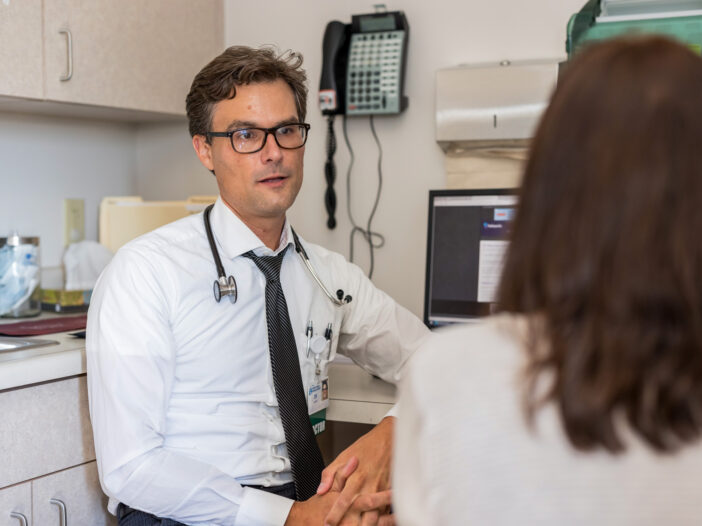
How does a patient help healthcare providers? By becoming an active, involved and informed member of their healthcare team. And as research has shown, patients who become involved in the decisions and the process of their care are more likely to have better outcomes. We encourage our patients to ask questions. And if you need to ask the same question again, don’t hesitate! Nothing is more important than being informed and feeling confident about your care. You are entitled to question nurses and providers about your healthcare and condition.
Here are some examples of the things you may want to discuss with your medical team:
Don’t be afraid to inquire about your provider(s)’s training and specialties, or their experience with people who have your condition.
If you have a question about Central Maine Healthcare’s expertise in treating your condition, ask your provider about the hospital.
When meeting with providers, write down important information. Or, bring someone with you to write things for you. It might feel overwhelming when discussing health issues. Ask your provider if they have any relevant brochures to give you. You may also find more information online, at reputable websites, at the library or through support groups.
Make sure you understand all phases of your treatment plan.
Know who will be taking care of you, how long the treatment will last and how you should expect to feel.
Understand that more tests or medications may not always be better. Ask your provider what a new test or medication is likely to achieve. Weigh things out; discuss any concerns.
Keep copies of your medical records from previous hospitalizations, especially if they were at another hospital.
Don’t be afraid to seek a second opinion. If you have hesitations about what the best treatment is, consult with one or more additional specialists. The more information you have about the options available to you, the more confident you will be in the decisions made.
Ask to speak with others who have undergone the procedure you are considering. These individuals can help you prepare for the days and weeks ahead. They can also tell you what to expect and what worked best for them as they recovered.
Go to Maine Health Management Coalition’s website to see how Maine hospitals perform on meeting patient safety standards.
Be sure you understand all medical forms you read and sign. Get clarification if you need it.
Have someone, such as a partner, family member or friend act as your advocate, to help you through your hospitalization. Your advocate can ask questions for you, answer for you if you cannot, and see that you receive the care you need. Advocates need to know your wishes regarding resuscitation and life support. Review consent forms with your advocate. They will also need to know what type of care you will need when you return home. They will monitor your recuperation at home and make medical calls on your behalf, if necessary.
During the surgical process, there are also many things you can do to enhance your safety.
Prior to surgery, ask the surgeon to mark the area that will be operated on.
Don’t be afraid to tell a nurse or provider if you are worried that you are receiving the wrong medication. It is important that you know what types of medication you are supposed to receive. Learn all you can about your medications: their brand names, generic names, their purpose and possible side effects. If you don’t recognize a medication, ask about it. If you need to take something regularly, learn your medication timetables.
If you are receiving an IV with medication, either you or your advocate can read the bag to see what it contains; find out long it should take for the bag to empty.
If you are given new medications by healthcare professionals, ask what they are, and inform them of any allergies or bad reactions you have had to that medication or similar ones. Also let them know what other medications you are taking, including vitamins, herbal supplements and over-the-counter drugs. Before leaving the hospital, be sure you can read the provider’s handwriting on any prescriptions you have, so that the pharmacist will also be able to read it.
Stay educated about your diagnosis, your condition, the medical tests you may be undergoing, and your treatment plan.
Don’t ever hesitate to question a healthcare professional if you think you are being confused with another patient. Make sure they know your name; they can confirm your identity by looking at your wristband.
Expect healthcare team members to introduce themselves when they enter your room. Look for their identification badges. This is especially important if you are a new mother. Never hand over your baby to someone you can’t identify.
Don’t be afraid of speaking up if you think a healthcare professional hasn’t washed their hands!
Make sure you are familiar with the operation of equipment used in your care. For example, if you will be using oxygen at home, do not smoke or allow anyone to smoke near you while oxygen is in use.
Before you leave the hospital, ask about follow-up care and review all instructions, making sure you understand them.
You have the right to lodge a grievance or complaint about your hospital stay or the care you receive while in the hospital with the Maine Department of Human Services Division of Licensing and Certification. Call or write: State of Maine Department of Human Services, Division of Licensing and Certification, State House Station 11, Augusta, Maine 04333. Tel. 1-800-383-2441 or TTY: Maine Relay at 711.
This agency does not address concerns about your hospital bill. Please contact Patient Financial Services directly if you have any questions about your bill.
You also have the right to contact: The Joint Commission, Office of Quality Monitoring, 1 Renaissance Blvd., Oakbrook Terrace, IL 60181.
